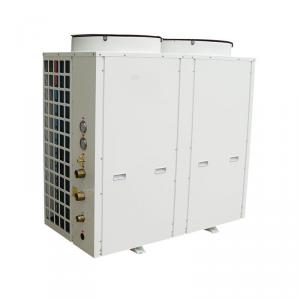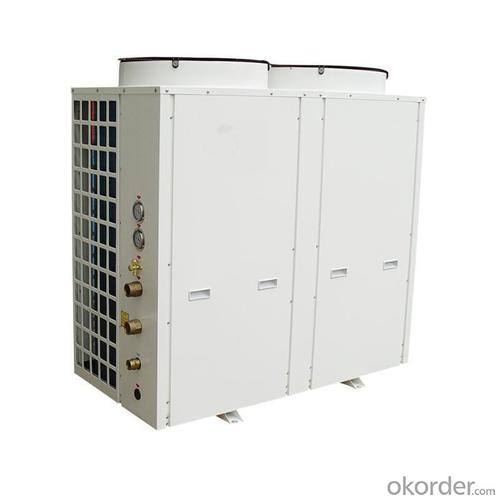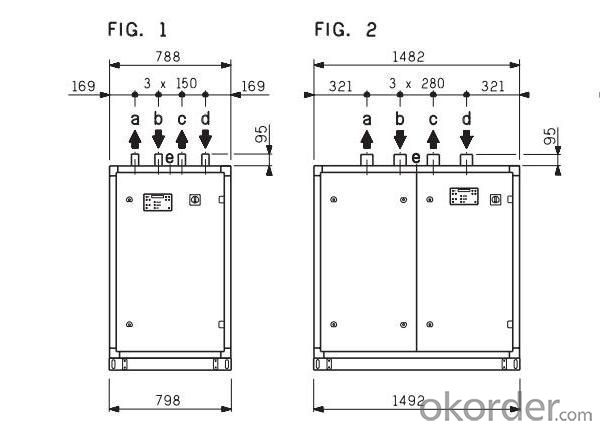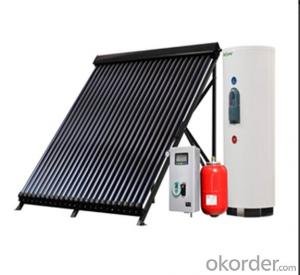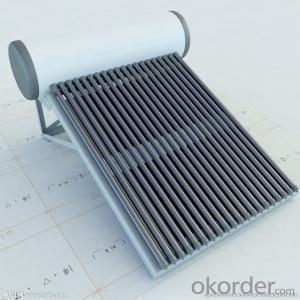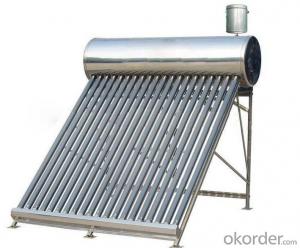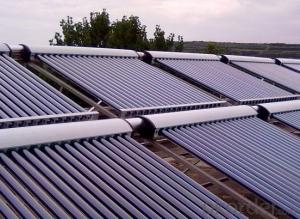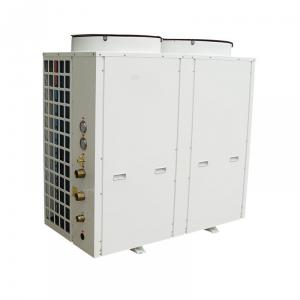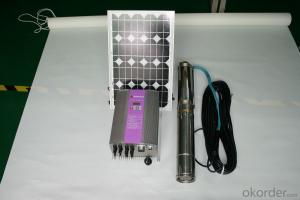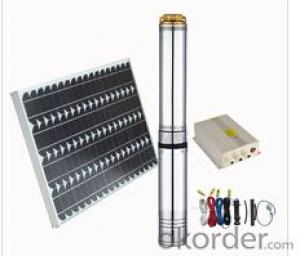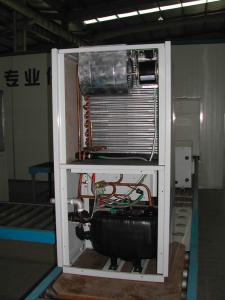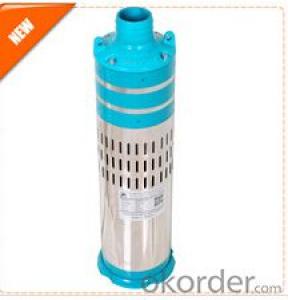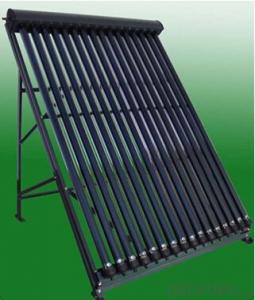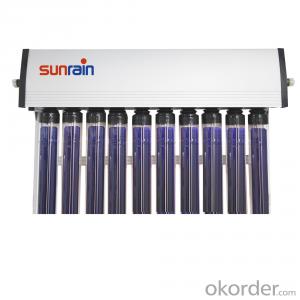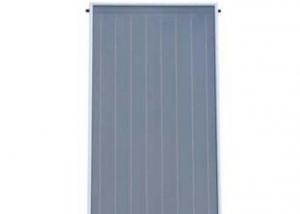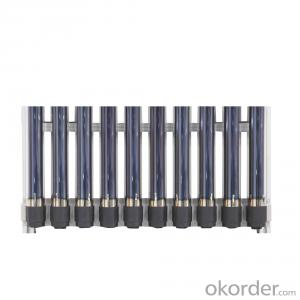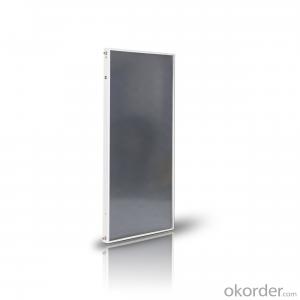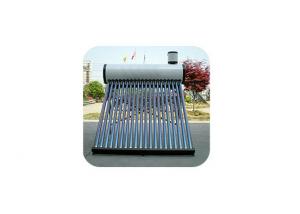Solar Water Heater for Pets - Ground-Sourcing Heat Pump 10-25WR
- Loading Port:
- China Main Port
- Payment Terms:
- TT or LC
- Min Order Qty:
- 1 Unit unit
- Supply Capability:
- 1000 Unit Per Year unit/month
OKorder Service Pledge
OKorder Financial Service
You Might Also Like
Specifications of Ground-sourcing Heat Pump
Ground sourced heat pumps simply move energy from one place to another. In the system, there is a refrigerant cycle, we call it reverse Carnot cycle, it consists of four component, Compressor, Condenser (doublepipe heat exchanger) ,Expansion valve, Evaporator (plate heat exchanger). The process of which is explained on the image below:
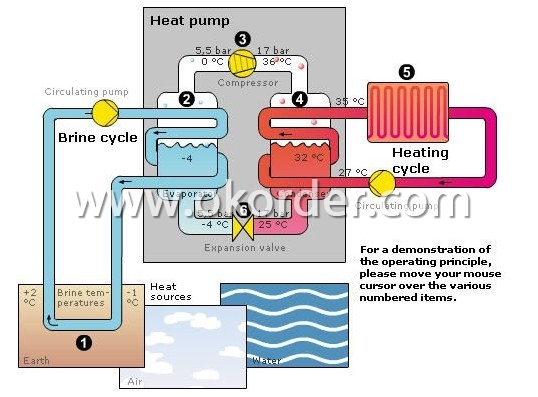
Technical Parameter of Ground-sourcing Heat Pump
| Items | Unit | 10WR | 15WR | 20WR | 25WR |
| Heating Capacity | Kw | 40.5 | 48 | 78 | 92 |
| Cooling Capacity | Kw | 32.5 | 38 | 66 | 80 |
| Input Power | Kw | 8.8 | 11.4 | 17.5 | 21.5 |
| Running Current Heating | A | 17.5 | 22.8 | 35 | 43 |
| Dimension | L mm | 1120 | 1120 | 1120 | 1120 |
| W mm | 503 | 603 | 603 | 603 | |
| H mm | 780 | 780 | 1560 | 1560 | |
| Weight | Kg | 268 | 298 | 525 | 525 |
| Power Supply | V/PH/HZ | 220V/50HZ | 380V/3PH/50HZ | ||
| COP | 3.9-4.8 | ||||
| Condenser type | Stainless steel plate type heat exchange | ||||
| Evaporator | Stainless steel ptype heat exchange | ||||
Ground Loop Types of Ground Sourcing Heat Pump
Ground Source Heat Pumps can be categorized as closed or open loops. Those loops can be installed in three ways: Horizontally, vertically, or in a pond/lake.
Components Description of Ground Sourcing Heat Pump
We mainly use Copeland Scroll Compressor. It is high efficiency, low noise, stable and long life span. We use plate heat exchanger, the heat pump can work automatically.
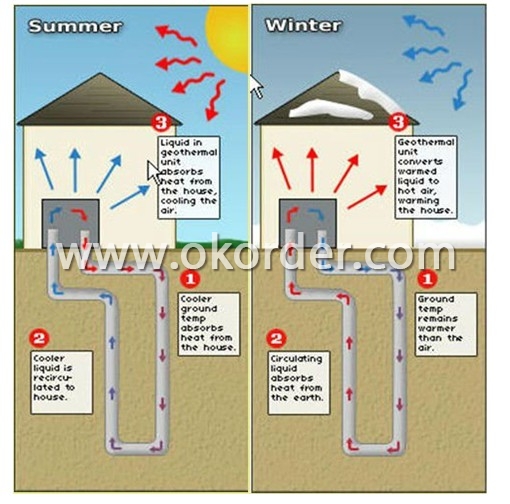
Usage and Applications of Ground Sourcing Heat Pump
Users can use it to supply sanitary hot water or/and heating house,house heating and house cooling.
Package and Delivery of Ground Sourcing Heat Pump
The whole system of Ground Sourcing Heat Pump is packaged in wooden box, delivered by sea. It should be avoid of moist, shaking and water to protect electricity product.
- Q: Does a solar water heater require batteries?
- No, a solar water heater does not require batteries. Unlike solar panels, which convert sunlight into electricity and store it in batteries for later use, solar water heaters directly heat water using the energy from the sun. They typically consist of a solar collector, which absorbs sunlight and transfers heat to a water storage tank or pipes, where the water is heated and stored for use. As a result, solar water heaters do not need batteries to function, making them a cost-effective and energy-efficient option for heating water.
- Q: What is the payback period for a solar water heater installation?
- The payback period for a solar water heater installation typically ranges from 3 to 7 years, depending on factors such as the initial investment cost, energy savings, and local incentives or rebates.
- Q: Can a solar water heater be used for heating water for agricultural purposes?
- Yes, a solar water heater can be used for heating water for agricultural purposes. Solar water heaters utilize the sun's energy to heat water, providing a cost-effective and sustainable solution for various applications, including agricultural needs. It can be used for tasks such as irrigation, livestock watering, greenhouse heating, and other agricultural processes requiring heated water.
- Q: Can a solar water heater be used in areas with limited access to sunlight for an extended period?
- No, a solar water heater cannot be effectively used in areas with limited access to sunlight for an extended period. The efficiency and performance of solar water heaters heavily depend on the availability of sunlight. In areas with limited sunlight, the system may not be able to generate enough heat to meet the desired water temperature and may not function optimally.
- Q: How does the cost of a solar water heater compare to traditional water heaters?
- The cost of a solar water heater can vary depending on various factors such as the size, brand, and installation requirements. Generally, the upfront cost of a solar water heater is higher than that of a traditional water heater. The average cost of a solar water heater can range from $2,000 to $5,000, including installation. On the other hand, traditional water heaters can range from $500 to $1,500, including installation. However, when considering the long-term costs, solar water heaters tend to be more cost-effective. Solar water heaters utilize sunlight to heat water, which means they rely on a free and renewable energy source. This significantly reduces the energy consumption and subsequently lowers the utility bills. In contrast, traditional water heaters rely on electricity or gas to heat water, leading to higher energy expenses in the long run. Additionally, solar water heaters have a longer lifespan compared to traditional water heaters. While traditional water heaters typically last 10-15 years, solar water heaters can last up to 20-30 years with proper maintenance. This longevity contributes to further savings over time as traditional water heaters may require replacement sooner. Moreover, solar water heaters are eligible for various federal, state, and local incentives and tax credits, further reducing the overall cost. These incentives can help offset the initial investment and make solar water heaters more affordable in the long term. In summary, while the upfront cost of a solar water heater is higher than that of a traditional water heater, the long-term cost savings, energy efficiency, and extended lifespan make solar water heaters a more cost-effective choice. Additionally, available incentives and tax credits can help offset the initial investment, making solar water heaters a financially viable and environmentally friendly option.
- Q: What is the expected performance of a solar water heater in different weather conditions?
- The expected performance of a solar water heater can vary in different weather conditions. In ideal conditions with clear skies and ample sunlight, the system will perform at its peak efficiency, providing hot water throughout the day. However, in cloudy or overcast weather, the performance may be reduced due to limited solar radiation. Similarly, during colder months or in areas with lower sunlight intensity, the heater's performance may be slightly lower compared to warmer and sunnier climates. Overall, while solar water heaters can still function and provide hot water in various weather conditions, their efficiency and output may be influenced by the amount of sunlight available.
- Q: Are there any maintenance requirements for a solar water heater?
- Yes, solar water heaters typically require some maintenance. This may include regularly checking and cleaning the collector, ensuring the water tank is properly insulated, inspecting and replacing any worn out components, and occasionally flushing the system to remove sediment buildup. Regular maintenance helps ensure optimal performance and extends the lifespan of the solar water heater.
- Q: Can a solar water heater be used for industrial purposes?
- Yes, a solar water heater can be used for industrial purposes. Solar water heaters can provide a cost-effective and environmentally friendly solution for heating large volumes of water required in various industrial processes such as manufacturing, cleaning, and heating. By harnessing the energy from the sun, these systems can significantly reduce the reliance on traditional fuel sources and lower operational costs for industries while promoting sustainability.
- Q: Can a solar water heater be used in areas with building restrictions?
- Yes, a solar water heater can be used in areas with building restrictions. Solar water heaters are typically installed on rooftops or in outdoor spaces, which may not require extensive construction or building permits. Additionally, they are often considered as environmentally friendly and energy-efficient solutions, making them more likely to comply with building restrictions and regulations. However, it is important to check with local authorities and building codes to ensure compliance and obtain any necessary permits or approvals.
- Q: How does the material of the solar collector affect the performance of a solar water heater?
- The material of the solar collector significantly affects the performance of a solar water heater. The choice of material determines the efficiency of heat absorption and transfer. Materials with high thermal conductivity and low heat loss, such as copper or aluminum, are preferred as they enhance heat absorption and minimize energy wastage. Additionally, the material's durability and resistance to corrosion are crucial in ensuring the long-term effectiveness of the solar water heater.
1. Manufacturer Overview
| Location | Shanghai,China |
| Year Established | 1989 |
| Annual Output Value | US$2.5 Million - US$5 Million |
| Main Markets | " Asia;Western Europe;North Africa" |
| Company Certifications | We are a leading manufacturer of a broad range of ground-sourcing heat pump. Over the past few years, we has enjoyed unprecedented growth due in large part to the support of our valued customers. |
2. Manufacturer Certificates
| a) Certification Name | |
| Range | |
| Reference | |
| Validity Period |
3. Manufacturer Capability
| a) Trade Capacity | |
| Nearest Port | Shanghai |
| Export Percentage | 1% - 10% |
| No.of Employees in Trade Department | About 1000 |
| Language Spoken: | English;Chinese |
| b) Factory Information | |
| Factory Size: | |
| No. of Production Lines | |
| Contract Manufacturing | OEM Service Offered;Design Service Offered |
| Product Price Range | Average |
Send your message to us
Solar Water Heater for Pets - Ground-Sourcing Heat Pump 10-25WR
- Loading Port:
- China Main Port
- Payment Terms:
- TT or LC
- Min Order Qty:
- 1 Unit unit
- Supply Capability:
- 1000 Unit Per Year unit/month
OKorder Service Pledge
OKorder Financial Service
Similar products
Hot products
Hot Searches
Related keywords
